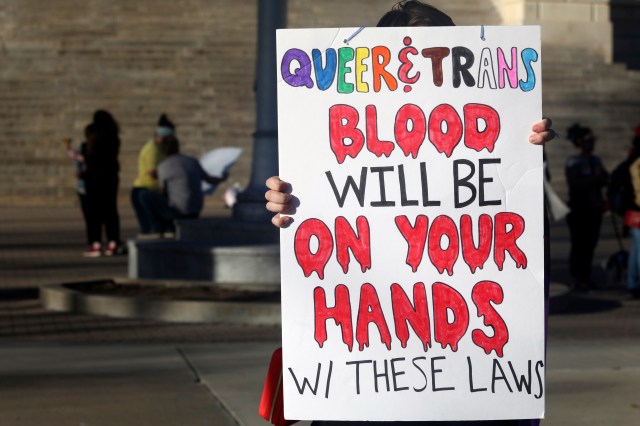
The story of LGBTQ+ advocacy in the U.S. has been one of advancements, often slow and hard-fought but inevitably moving forward. Transgender rights activists now admit they are playing defense in the face of extraordinary challenges in state legislatures, and two of the largest groups are banding together to fend off the assault.
According to Andy Marra, executive director of the Transgender Legal Defense and Education Fund, “this is going to be a defense game—a movement-strengthening game. We have witnessed a powerful, well-organized, and heavily resourced effort to undo the years of progress made by our movement.”
The crux of the attack: dozens of bills targeting trans people have been passed in Republican-controlled states over the past few years. Many laws forbid transgender minors from receiving gender-affirming medical care or prohibit trans athletes from participating in girls’ and women’s school sports teams.
The TLDEF and the National Center for Transgender Equality announced in January that they intend to merge this summer in response to a new wave of anti-trans actions that were already implemented this time. The new organization may be named Activists for Trans Equality; its CEO will be Marra, and Rodrigo Heng-Lehtinen, who currently holds that position with the NCTE, may serve as its executive director.
Marra stated that 2022 was a critical year for deciding whether to undertake the merger. Texas Attorney General Ken Paxton and Governor Greg Abbott, both Republicans, ordered state child welfare workers to investigate transgender children’s families for what Abbott referred to as “abusive gender-transitioning services.”
According to Marra, “I realized we needed a stronger, bolder response to the extraordinary hostility and legislative assaults on trans people statewide.”
Unlike some mergers, this one is not intended to reduce costs or consolidate, according to Heng-Lehtinen. He stated that each organization’s existing staff will be retained, and the new organization will likely have about 50 employees by the end of the year, working remotely as well as out of offices in New York and Washington.
“You think there is some kind of problem or duplication when you hear ‘merger,'” he said. “Not in this case; we just believe that we will be stronger.”
Continuing to sue, state by state, against the anti-trans rules is essential for Marra and Heng-Lehtinen and their allies in other LGBTQ+ rights organizations. Federal courts, including some appointed by Republican presidents, have blocked some of the measures while others have gone into effect.
Participating in political campaigns is another top priority this election season.
“We need elected officials who support trans people to win their races and defeat opponents who just demonize them for political gain,” said Heng-Lehtinen. He portrayed the anti-trans hostility as a backlash to the broader advances made in recent years by the LGBTQ+ rights movement.
“Anti-LGBT groups are shaking in their boots,” he claimed. “They are fighting so fiercely because we have made so much progress.”
His mother, Ileana Ros-Lehtinen, served in Congress for 30 years starting when he was 3 years old. He has been deeply involved in politics since childhood.
Ros-Lehtinen, who disagreed with most of her Republican colleagues in Congress, became a fervent advocate of LGBTQ+ rights. She was the first Republican to support the legalization of same-sex marriage in the GOP House. She spoke out in favor of Rodrigo’s decision to identify as a trans man.
In a 2016 video urging parents to accept their transgender children, Ros-Lehtinen said, “What makes our home but very proud of Rodrigo is that he’s so happy living an authentic life, being honest about himself, and bringing much joy to our existence.”
Since then, the national political climate regarding LGBTQ+ rights has drastically changed.
North Carolina passed a “bathroom bill” restricting trans people’s use of public restrooms in 2016, sparking a significant backlash that included the cancellation of potentially profitable sporting events and business ventures.
As new anti-trans measures went into effect in North Carolina and elsewhere over the past few years, the business world has generally avoided similar risks. Bud Light’s sales plummeted due to liberal opposition to an advertising campaign featuring trans celebrity Dylan Mulvaney.
At a time when special interest groups are examining how they deal with issues like affirmative action and workplace diversity, Marra noted that some corporations had become more cautious about engaging in potentially divisive political issues.
“We want them to uphold their values,” Marra remarked.
Research shows that some trans people have considered moving to a more accepting city or state, demonstrating the cumulative effect of the anti-trans laws. In recent years, several new organizations have emerged that provide emergency funds to people and families affected by anti-trans legislation to travel or get health care or services outside their home state.
Despite the current setbacks, Marra, who has been involved in the LGBTQ+ rights movement for 20 years, remains optimistic.
“We are engaged in a number of battles, but in the end, we are on the right side of history,” she said.
“This time, we have an opportunity to involve the next generation of citizens in the next phase of the fight for equality in this nation,” she continued. “We need to share our stories with ordinary people all over the country.”



